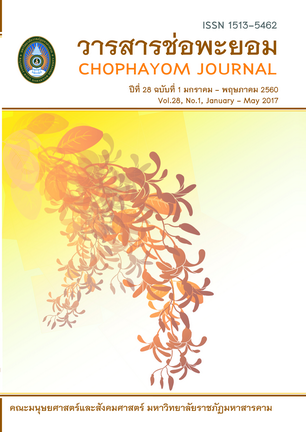การพัฒนาความสามารถด้านการอ่านออกเสียงภาษาจีน โดยใช้ชุดฝึกประกอบการจัดกิจกรรมแบบ BBL สำหรับนักศึกษาชั้นปีที่ 1 สาขาวิชาภาษาจีน คณะมนุษยศาสตร์และสังคมศาสตร์ มหาวิทยาลัยราชภัฏมหาสารคาม The Development of Pronunciation with Brain Based Learning Activities
Abstract
บทคัดย่อ
การวิจัยครั้งนี้ มีจุดมุ่งหมายเพื่อ 1) เพื่อศึกษาประสิทธิภาพของแผนการจัดการเรียนรู้ การอ่านออกเสียงภาษาจีน สำหรับนักศึกษาชั้นปีที่ 1 โดยใช้ชุดฝึกประกอบการจัดกิจกรรมแบบ BBL ให้ได้ตามเกณฑ์ร้อยละ 80/80 2) เพื่อศึกษาค่าดัชนีประสิทธิผลของแผนการจัดการเรียนรู้เรื่อง การอ่านออกเสียงภาษาจีน สำหรับนักศึกษาชั้นปีที่ 1 โดยใช้ชุดฝึกประกอบการจัดกิจกรรมแบบ BBL 3) เพื่อเปรียบเทียบผลสัมฤทธิ์ของนักศึกษาชั้นปีที่ 1 ระหว่างก่อนและหลังเรียน 4) เพื่อศึกษาความพึงพอใจของนักศึกษาชั้นปที่ 1 ที่มีต่อแผนการจัดการเรียนรู้ การอ่านออกเสียงภาษาจีน โดยใช้ชุดฝึกประกอบการจัดกิจกรรมแบบ BBL กลุ่มตัวอย่าง ได้แก่ นักศึกษาชั้นปีที่ 1 สาขาวิชาภาษาจีน คณะมนุษยศาสตร์และสังคมศาสตร์ มหาวิทยาลัยราชภัฏมหาสารคาม ภาคเรียนที่ 2 ปีการศึกษา 2559 จำนวน 25 คน เครื่องมือที่ใช้ในการวิจัย 1) ชุดฝึกประกอบการจัดกิจกรรมแบบ BBL จำนวน 5 แผน 2) แบบทดสอบผลสัมฤทธิ์ทางการเรียน ชนิดเลือกตอบ 3 ตัวเลือก จำนวน 20 ข้อ ซึ่งมีค่าอำนาจจำแนกตั้งแต่ 0.40 – 0.80 มีค่าความยากง่ายตั้งแต่ 0.57 – 0.79 และมีค่าเชื่อมั่นทั้งฉบับ เท่ากับ 0.95 3) แบบวัดความพึงพอใจของนักศึกษาชั้นปีที่ 1 ที่มีต่อการเรียน ซึ่งมีค่าอำนาจจำแนกตั้งแต่ 0.28 – 0.89 และมีค่าความเชื่อมั่นทั้งฉบับ เท่ากับ 0.88 สถิติที่ใช้ในการวิเคราะห์ข้อมูลได้แก่ ร้อยละ ค่าเฉลี่ย ส่วนเบี่ยงเบนมาตรฐาน และทดสอบสมมุติฐาน โดยใช้ t-test ผลการวิจัยปรากฏดังนี้ 1. ประสิทธิภาพของแผนการจัดการเรียนรู้ เรื่อง การอ่านออกเสียงภาษาจีน โดยใช้ชุดฝึกประกอบการจัดกิจกรรมแบบ BBL มีประสิทธิภาพเท่ากับ 95.40/90.20 ซึ่งเป็นไปตามเกณฑ์ร้อยละ 80/80 ที่กำหนดไว้ 2. ค่าดัชนีประสิทธิผลของแผนการจัดการเรียนรู้เรื่องการอ่านออกเสียงภาษาจีน โดยใช้ชุดฝึกประกอบการจัดกิจกรรมแบบ BBL มีค่าเท่ากับ 0.8149 แสดงว่า นักศึกษามีความก้าวหน้าในการเรียนเพิ่มขึ้น คิดเป็นร้อย ละ 81.49 3. นักศึกษาชั้นปีที่ 1 มีคะแนนการทดสอบหลังเรียนสูงกว่าก่อนเรียนอย่างมีนัยสำคัญทางสถิติที่ระดับ .05 4. นักศึกษาชั้นปีที่ 1 มีความพึงพอใจต่อการเรียนในภาพรวมอยู่ในระดับมาก (มีค่าเฉลี่ย 4.08) คำสำคัญ : การอ่านออกเสียงภาษาจีน, การจัดกิจกรรมกลุ่มร่วมมือแบบ BBL
ABSTRACT
The purposes of this research were to : 1) to create the 1st year students of Chinese
major for Chinese lesson plans learning in Pronunciation with Brain Based Learning Activities. at the 80/80 efficient criteria, 2) to study effectiveness index of Chinese lesson plans created, 3) to compare the point of standards before and after Learning, and 4) to study the satisfaction of the 1st year students with learning Chinese result in The Development of Pronunciation with Brain Based Learning Activities. The sample of this research is 25 students in the 1st year students at Rajabhat Maha Sarakham University, during the second semester of 2016 acedemic year, Obtained using the Cluster Random Sampling. The instruments were : 1) Lesson plans of Chinese result in Pronunciation with Brain Based Learning Activities For the 1st year students, By using Brain Based Learning Activities composed of 5 plans with 10 hours, 2) a 20-items 3 choices test of Pronunciation
with Brain Based Learning Activities which the degree of discriminating power ranging 0.40-0.80, difficulties ranging 0.57-0.79 and a reliability of 0.95, and 3) the satisfaction of the 1st year students with learning as 5 Level rating scale, 10-items which the degree of discriminating power ranging 0.28-0.89, and a reliability of 0.88. The statistics used for analyzing data were Percentage, Mean, Standard deviation, and t-test (Independent samples). The research findings were as follows: 1. Chinese lesson plans for Pronunciation with Brain Based Learning Activities For the 1st year students met 95.4/90.2 of efficient criteria respectively. 2. The effectiveness index of the lesson plans created was 0.8149
as 81.49 % respectively. 3. The students had post-test is higher than Pre-test was statistically at .05 level. 4. The satisfaction of the 1st year students with learning was in the high level mean of 4.08. Keywords : Pronunciation, Brain Based Learning






